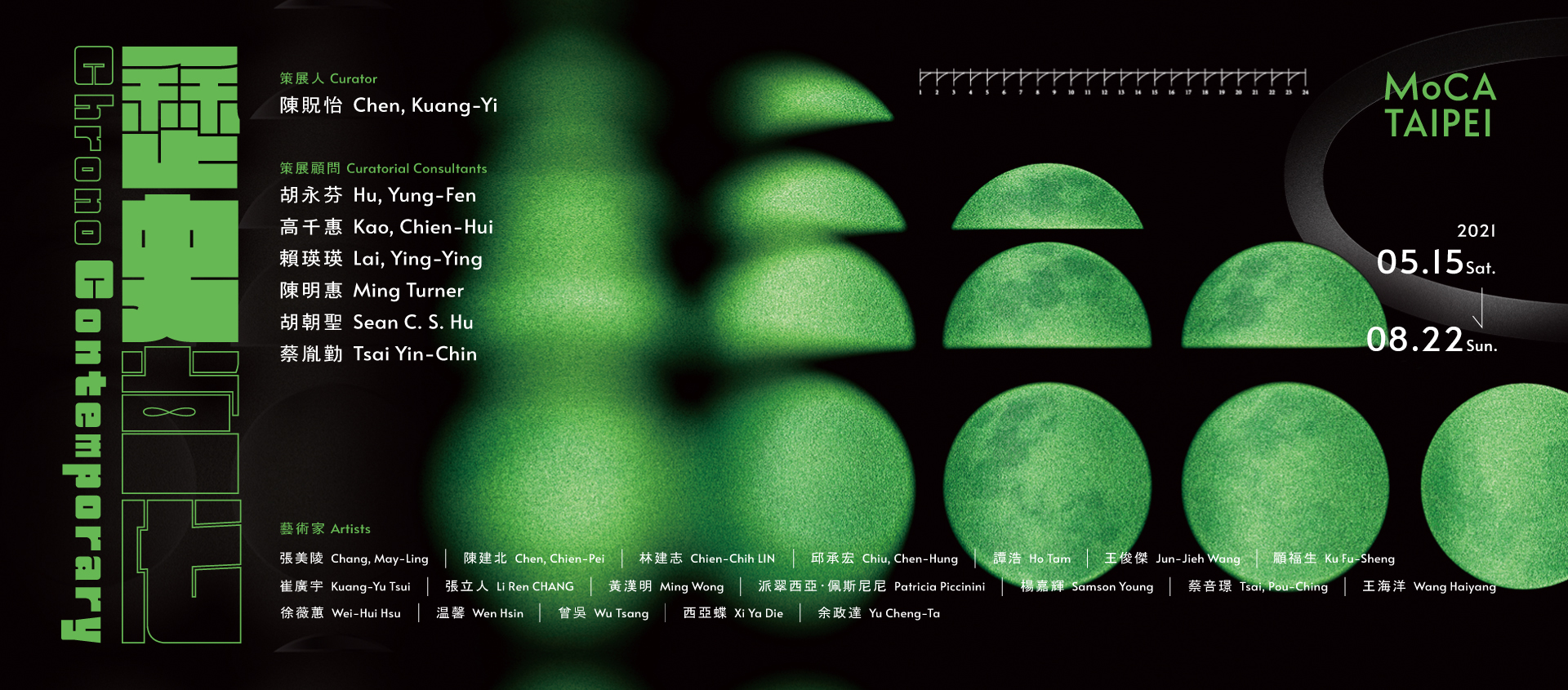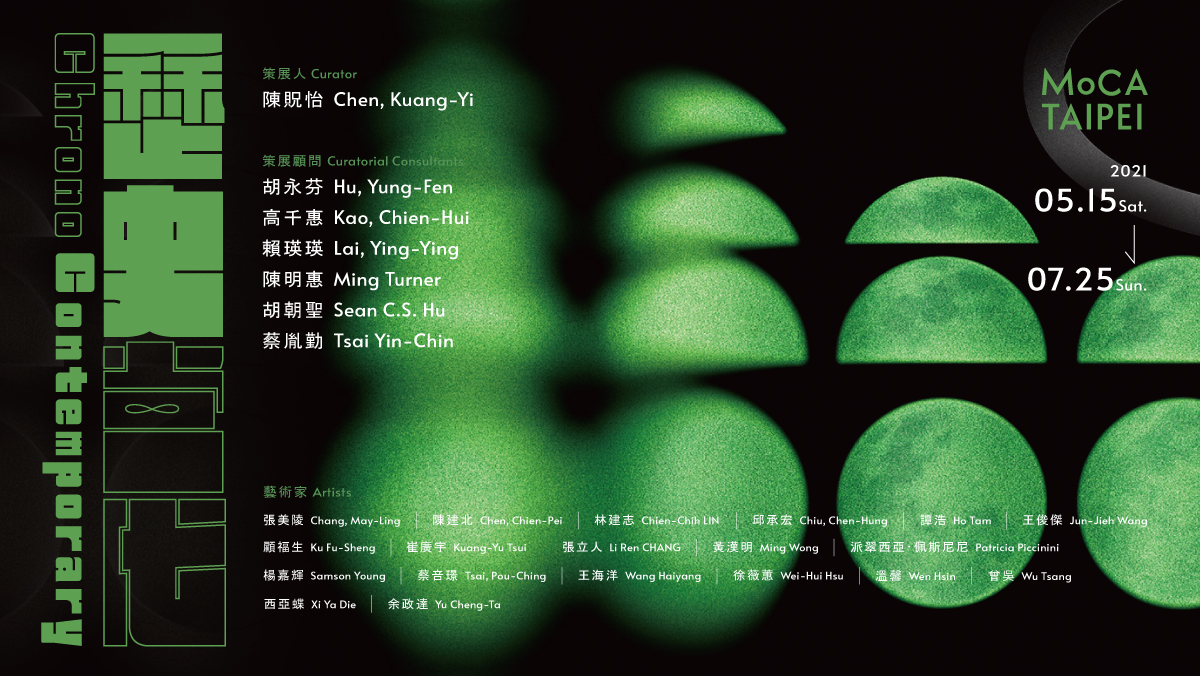

Museum of Contemporary Art, Taipei
Sunday Sunday
10AM - 6PM



Sunday Sunday
10AM - 6PM
EXHIBITIONS & EVENTS

2021 / 05 / 15 Sat.
2021 / 08 / 22 Sun.
10:00 - 18:00
Curator
Chen, Kuang-Yi
Curatorial Consultants
Hu, Yung-Fen
Kao, Chien-Hui
Lai, Ying-Ying
Ming Turner
Sean C.S. Hu
Tsai Yin-Chin
Artists
Chang, May-Ling
Chen, Chien-Pei
Chien-Chih LIN
Chiu, Chen-Hung
Ho Tam
Jun-Jieh Wang
Ku Fu-Sheng
Kuang-Yu Tsui
Li Ren CHANG
Ming Wong
Patricia Piccinini
Samson Young
Tsai, Pou-Ching
Wang Haiyang
Wei-Hui Hsu
Wen Hsin
Wu Tsang
Xi Ya Die
Yu Cheng-Ta

Online Exhibit:
Chrono-contemporary marks the overture of MoCA Taipei’s “Twenty-year Anniversary Exhibition Series.” Curated by Chen, Kuang-Yi, the exhibition title clearly indicates a retrospection of MoCA Taipei’s exhibitions since its inauguration in 2001. However, the exhibition in fact revolves around the “temporality” of contemporary art as well as the contradiction and paradox between “history” and “the contemporary” arising from historicizing contemporary art. In the 1980s, when people started to fully accept and embrace the flourishing and diverse artistic creation in the 60s and 70s, the number of the so-called “museum of contemporary art” or “museum of modern and contemporary art” has also grown exponentially worldwide. On the one hand, the complexity, diversity and obscurity of contemporary art compel audiences to look for its meaning from its origin; on the other hand, contemporary works of art understood and validated through such an approach consequently become a continuation of the past—this process forms the institutionalization and historicization of contemporary art. However, a “museum of contemporary art” is self-conflicting because the objective of such an art museum is to preserve changes in art. It shoulders the mission to consistently explain contemporary art and must strive to achieve a balance between past and present. When the contemporary becomes part of history and we are still living in it, the past and present time also become overlapped and interlaced, which is the core concept of this exhibition.
This exhibition first systematically chronologizes MoCA Taipei’s exhibitions presented in the past two decades and replaces “artworks” with “exhibitions” to unfurl a scope of exhibition history. The writing of exhibition history means to alter the perspective of writing art history: instead of fixating on judging the authenticity, relation, quality of a certain object and deciding whether it is to be considered art or not, the focus is shifted to the following questions: How are these objects used by people? When and where do people use what objects or artworks to deliver what meanings and contents to whom? What are the exhibition conditions and methods? This exhibition re-deploys the selected exhibitions and juxtaposes them with other exhibitions taken place in the past to facilitate new dialogues between curators and artists in the past and at present time while engendering interactions between past audiences and the audience today. This process of repeated dialogues is like a Möbius strip and aims to unravel and revitalize existing ideas about history.
Therefore, invited by the curator Chen, Kuang-Yi, various curators and artists have returned to MoCA Taipei with their previous exhibitions, including Lai, Ying-Ying and Lan Wen-Yu who co-curated MoCA Taipei’s inaugural exhibition in 2001, The Gravity of the Immaterial; Kao, Chien-Hui who curated Trading Place: Contemporary Art Exhibition in 2005 to question the nature of museums of contemporary art; Hu, Yung-Fen who curated the popular exhibition in 2009, The Simple Art of Parody; Ming Turner who curated Post—humanist Desire in 2013 that featured advanced technological issues; Sean C. S. Hu who curated Spectrosynthesis— Asian LGBTQ Issues and Art Now in 2017, the first LGBTQ art exhibition ever hosted by an official art museum in Asia; and artists of different generations, such as Chen, Chien-Pei, Jun-Jieh Wang, Kuang-Yu Tsui, Wei-Hui Hsu and Chiu, Chen-Hung, who presented solo exhibitions at the experimental space MoCA Studio in the 2010s. As the curators and artists re-engage in various topics, representing, replicating, remaking, renewing or supplementing new contents, these exhibitions are the past exhibitions but not quite; so are the curators, the artists and the artworks. Respectively, they have returned with different perspectives, attitudes, identities and positions, orchestrating a banquet of MoCA Taipei’s exhibition from past twenty years for the audience in 2021. In addition, curator Tsai Yin-Chin, who specializes in the study of artist books, is invited to curate an exhibition for R105, which features the exhibition catalogues of every one of MoCA Taipei’s exhibitions in the past two decades, transforming R105 into a survey site of exhibitions.
MORE
LESS
CLOSE
CLOSE
Copyright Notice
MOCA Taipei holds a high respect for the copyright of others, and it is stated in MOCA Taipei’s terms of service that any user of the museum’s service shall not infringe on others’ copyright. Therefore, MOCA Taipei hereby ask all our users to respect others’ copyright. If you think any of the content on MOCA Taipei’s website or anyone using MOCA Taipei’s service has infringed on your copyright, we strongly advice to you to file a complaint according to the regulations stated below, and MOCA Taipei customer service center will initiate related procedures as soon as possible.
If any of the content on MOCA Taipei’s website or anyone using MOCA Taipei’s service
has infringed on your copyright, please fill out the “Copyright Infringement
Notice,” provide the information and statements listed on the notice, and send them
to MOCA Taipei via fax.
1. Signature of the copyright owner or the signature of the proxy of the copyright
owner; document proving the ownership of the copyright and the copyrighted contents,
i.e. the cover and related pages of a publication, print-outs of webpage contents
and the URL.
2. The webpage and URL containing the contents that cause the copyright
infringement.
3. Your contact address and phone number.
4. A written statement stating that you believe the use of the webpage content is
without the consent of the copyright owner, the proxy of the copyright owner, or the
authorization of the law.
5. A written statement confirming that the information you state in the notice is
truthful and you hereby make the statement as the copyright owner or the proxy of
the copyright owner.
1. MOCA Taipei will remove the webpage content claimed to cause the copyright
infringement as soon as possible after receiving your notice, and will inform the
user about the infringement via email. If the said user objects to said
infringement, MOCA Taipei can provide your name, email or phone number to said user
so that direct communication can be achieved to resolve the dispute.
2. According to MOCA Taipei’s privacy policy and related regulations, MOCA Taipei is
only allowed to provide a user’s personally identifiable information to a third
party by the request of the law or a governmental agency unless said user agrees or
for the purpose of providing a service. Therefore, when you file a report, MOCA
Taipei will only remove the contents causing the copyright infringement, and will
not provide you any personally identifiable information of said user. If you wish to
obtain the user’s information, a legal proceeding must be filed at the District
Prosecutor’s Office or the Criminal Investigation Bureau, who will issue an official
letter to MOCA Taipei requesting the user’s information. In the case, MOCA Taipei
will comply accordingly.
Privacy and Data Protection Policy
MOCA Taipei values user’s privacy very much and has implemented the following privacy and data protection policy, which is listed below for your reference.
The privacy and data protection policy includes MOCA Taipei’s management of personal
identifiable information collected when providing users the website service as well as MOCA
Taipei’s management of any personal identifiable information shared between the museum and
our business partners.
The privacy and data protection policy is not applicable to any enterprise other than MOCA
Taipei, nor does it apply to those that are not staff or managements employed by MOCA
Taipei.
When you register a MOCA Taipei account, use MOCA Taipei’s products or services, browse MOCA
Taipei’s website, take part in related promotional activities or gifting programs, MOCA
Taipei will collect your personal identifiable information. MOCA Taipei is also allowed to
obtain said information from our business partners.
When you register a MOCA Taipei account, you will be asked to provide your name, email, date
of birth, sex, work title, field of profession and personal interests. Once your
registration is successful and the account is successfully logged into for the use of our
service, we will be able to recognize you.
MOCA Taipei also automatically receive and record the server data on your browser, including
IP address, the information in MOCA Taipei’s cookie and the record of visited webpages.
MOCA Taipei uses the information for the following purposes: to improve advertisement and
webpage contents provided for you, to complete your request for a certain product and to
notify you about a special event or new project.
MOCA Taipei will not sell or loan your personal identifiable information to anyone.
In the following circumstances, MOCA Taipei will provide your personal identifiable
information to a governmental agency, an individual or a company.
To obtain your consent before sharing the information with other individuals or companies.
To provide a requested product or service, which requires sharing your information with
other individuals or companies.
To provide a requested product or service, which requires providing the information to
companies providing the product or service on behalf of MOCA Taipei. (Without our notice in
advance, these companies will not have the right to use the personal information we provided
for purposes other than provide a product or service.
To abide the law or the request of a governmental agency.
When an action on the website violates MOCA Taipei’s terms of service or the specific user’s
guidelines of a product or service.
Other information required to be disclosed by the Computer-Processed Personal Data
Protection Law or other regulations.
To protect user’s privacy and personal data, MOCA Taipei is not allowed to look up other
user’s account information for you. Should you need to look up someone else’s information
due to legal issues, please contact the police to file a legal proceeding. MOCA Taipei will
fully cooperate with the police to provide necessary information to assist with the
investigation and solve the case.
MOCA Taipei will access your computer setup to extract MOCA Taipei’s cookie.
MOCA Taipei allows the companies that place advertisements on the museum website to access
your computer setup and extract cookies. Other companies will follow their own privacy and
data protection policies to use cookies instead of MOCA Taipei’s policy. Other advertisers
or companies are not allowed to extract MOCA Taipei’s cookie.
When MOCA Taipei conducts tasks related to our products and services, web beacons are used
to access our website network to use cookies.
MOCA Taipei’s users have the right to revise their personal MOCA Taipei account information
and set up personal preferences anytime, including the option as to whether you would like
to receive notifications about special events or new products.
Based on the Computer-Processed Personal Data Protection Law, when the purpose of using your
personal information expires, MOCA Taipei will provide the service to delete your account
and data. However, to do so, please contact us via telephone.
MOCA Taipei adopts a method that conforms to the Computer-Processed Personal Data Protection
Law to protect your personal information.
To protect your privacy and safety, the data in your MOCA Taipei account will be
password-protected.
Under some circumstances, MOCA Taipei uses the standard SSL security system to ensure the
safety of data transmission.
MOCA Taipei has the right to revise our policies at any time necessary. When the regulations
regarding using personal information are extensively revised, public announcements will be
made on our website to inform you about the revisions.
Please tell us your ideas and suggestions here.